Sports
/ArcaMax
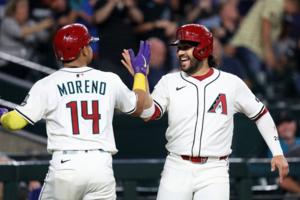
Dodgers lose to Arizona in first real test in 'the best division in baseball'
PHOENIX — It’s much too early to call it 2021 yet.
But, just like the last time the Los Angeles Dodgers tried to defend a World Series title, the National League West isn’t presenting the easiest of paths.
Entering Thursday night, the division was home to the best team in baseball, the 25-win Dodgers. But, based on overall league ...Read more
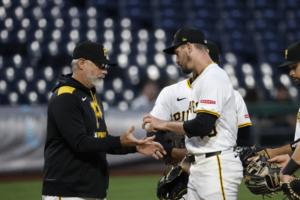
Jason Mackey: Derek Shelton was just a symptom of Pirates' larger illness
PITTSBURGH — It took longer than most expected, but the Pirates might’ve actually figured out how to screw up a one-car funeral.
Or at least the firing of one man — in this case, Derek Shelton.
How did we arrive at this point? It’s a question worth asking because it sure isn’t accurate or fair to pin everything on Shelton. At the ...Read more
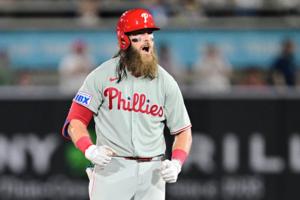
Phillies' bats get hot late to complete a sweep of the Rays in 7-6 extra-inning victory
TAMPA, Fla. — For seven innings on Thursday, it seemed as if the Phillies’ red-hot offense ran out of steam.
They had just two hits and trailed the Tampa Bay Rays 5-1, with the possibility of a sweep shrinking more and more with each groundout.
And yet they didn’t lie down. By the end of what was ultimately a 7-6 comeback win, the ...Read more
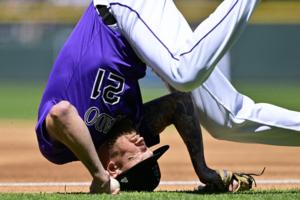
Tigers sweep sloppy Rockies in doubleheader by combined 21-3 margin
DENVER — Following the Colorado Rockies’ 10-2 Game 1 loss to the Detroit Tigers on Thursday afternoon, veteran left-handed starter Kyle Freeland was emotional.
When asked to compare what his reeling Rockies are doing to turn things around versus what teams such as the Tigers and Kansas City Royals have done, the Colorado native was blunt.
...Read more
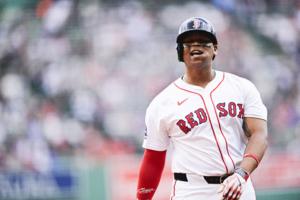
Rafael Devers calls out Craig Breslow, Red Sox front office: 'I don't feel that they stayed true to their word'
BOSTON — Rafael Devers was finally settling in as the Red Sox designated hitter, after a tumultuous spring training that saw him forced out of his third base job for Alex Bregman.
But when first baseman Triston Casas suffered a season-ending injury last Friday, Devers found himself pulled into the maelstrom again.
Speaking in the clubhouse ...Read more
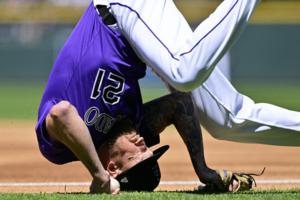
Sloppy Rockies hammered by Tigers in Game 1 of doubleheader
DENVER — Following the Colorado Rockies’ 10-2 Game 1 loss to the Detroit Tigers on Thursday afternoon, left-handed starter Kyle Freeland was emotional.
And when asked to compare what the reeling Rockies are doing to turn things around versus what teams such as the Tigers and Royals have done, he was blunt.
“What they’re doing is right,...Read more
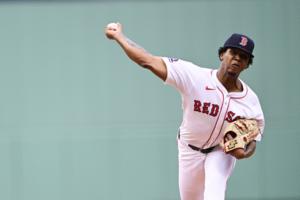
Brayan Bello, bullpen shut out Rangers in 5-0 Red Sox win
BOSTON — For the third consecutive series and sixth time this season, the Red Sox rebounded from an opening loss to win the slate.
They defeated the visiting Texas Rangers, 5-0, on Thursday afternoon to pick up their 20th victory of the season and get back in the win column (20-19).
Brayan Bello, Justin Slaten, Garrett Whitlock and Liam ...Read more
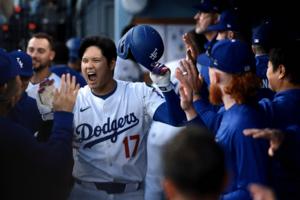
Dylan Hernández: Shohei Ohtani pitching this season initially felt like a luxury. Now it's a necessity.
LOS ANGELES — The leisurely pace at which he is building up his arm points to a lack of urgency, but don't be deceived. His team's place in the standings indicates his return to the mound is more of a luxury than a necessity, but don't be lured into a false sense of security.
The Dodgers need Shohei Ohtani to pitch this season, and they need ...Read more
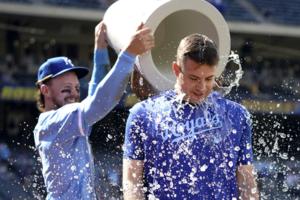
Royals push win streak to six games, tie franchise record by beating White Sox
KANSAS CITY, Mo. — At this point, it wouldn’t matter the opponent, because the Kansas City Royals are on a serious roll.
With their 10-0 victory Thursday against the Chicago White Sox at Kauffman Stadium, the Royals have won six straight games, nine of their last 10 and 15 of 17.
By finishing a four-game sweep of Chicago, the Royals (23-16...Read more
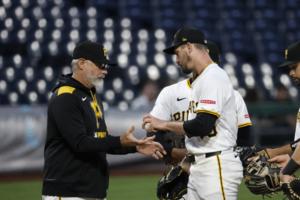
Pirates fire manager Derek Shelton after 12-26 start to season
PITTSBURGH — Derek Shelton has been relieved of his duties as Pirates manager, the team announced on Thursday.
Bench coach Don Kelly will take over as manager.
“Derek worked incredibly hard and sacrificed a lot over five-plus years. His family became a big part of the Pirates family, and we will miss that,” Pirates general manager Ben ...Read more
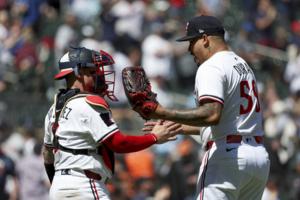
Brooks Lee's clutch double powers Twins past Orioles 5-2 for a three-game sweep
MINNEAPOLIS — Brooks Lee struck out in his first three at-bats and committed an error that led to a run Thursday, but all was forgiven with one swing in the eighth inning.
Lee, batting with the score tied and two outs, laced an elevated fastball in a two-strike count against Baltimore Orioles lefty Gregory Soto into the left-center gap for a ...Read more

Rockies lose to Tigers in 10 innings, slide to a 6-29 record
This one’s going to leave a mark. And that’s saying something considering that the Rockies now own a 6-29 record.
The Tigers beat them 8-6 in 10 innings on Wednesday night at Coors Field. Spencer Torkelson drove a double off closer Zach Agnos into the right-center gap to score ghost runner Riley Greene.
Agnos got the next two hitters, but ...Read more
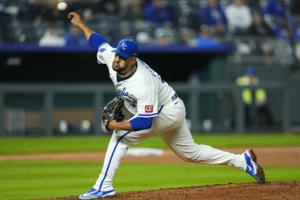
Royals' pitching dominates again in win over White Sox
KANSAS CITY, Mo. — The Kansas City Royals’ pitching continues to carry the team.
And Wednesday, because of that, Kansas City kept up its string as the hottest team in baseball with a 2-1 home victory against the Chicago White Sox.
On this night, it was right-handed Michael Wacha’s turn to pitch a gem. The veteran was dominant in his ...Read more
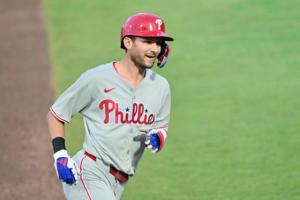
Trea Turner jumpstarts Phillies' offense in 7-0 shutout win over the Rays
TAMPA, Fla. — A few hours before first pitch on Wednesday, Rob Thomson rapped his knuckles on the desk in the visiting manager’s office at Steinbrenner Field.
“Trea seems like — knock on wood — he gets at least a base hit every night," he said.
Perhaps the superstition paid off, because Trea Turner did that and more in the Phillies�...Read more
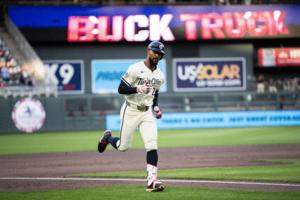
Twins stay clear of Orioles after Byron Buxton's three-run homer
MINNEAPOLIS — The Minnesota Twins matched their season-high winning streak Wednesday, and Byron Buxton matched his career-high home-run streak.
These occurrences are not unrelated.
Buxton cracked a Charlie Morton curveball into the upper deck down the left field line with two runners on base in the third inning, the third consecutive game he...Read more
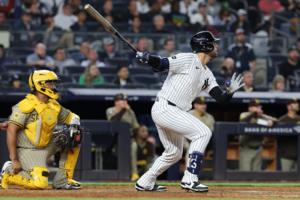
Yankees walk-off Padres in extras, overcome Dylan Cease's no-hit bid with late longballs
NEW YORK — Hours before the Yankees hosted the San Diego Padres for a rubber match at Yankee Stadium, Aaron Boone took a question about his team’s league-leading offense.
“We’ve got a lot of firepower,” the manager said, in part, a night after the Yankees scored 10 runs in the seventh inning of a 12-3 win.
Such a forceful explosion ...Read more
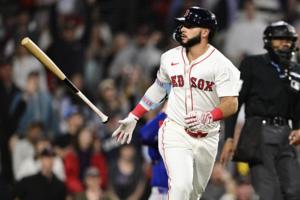
Alex Bregman, Wilyer Abreu power Red Sox past Rangers
BOSTON — Prior to the game, Alex Bregman told the Boston Herald that he didn’t like the way his swing felt, and after he was finished talking he needed to go get some more work in.
Clearly whatever adjustments he made paid off.
Bregman had a huge day at the plate in Wednesday’s bounce back win, going 3 for 4 with a home run, three RBI ...Read more
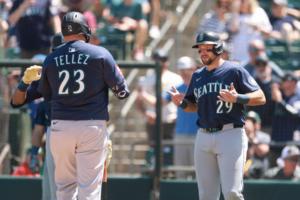
Mariners rally past Athletics again for ninth straight series win
WEST SACRAMENTO, Calif. — New guys. Role players. Guys that have been around a while.
It doesn’t matter about their history or longevity with the Seattle Mariners right now. Seemingly someone is coming through no matter what.
This time it was the trio of Rowdy Tellez, Leody Taveras and Dylan Moore who provided the three biggest swings as ...Read more
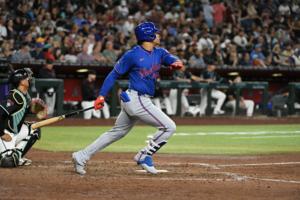
Juan Soto homers twice to help Mets take series vs. Diamondbacks
PHOENIX — Juan Soto has been the subject of much consternation in New York over the last few months, but in recent weeks, the talk about the slugger has hit a fever pitch. Fans from all five boroughs and beyond have been wanting to know what’s wrong with Soto?
As it turns out, he’s just fine.
Soto hit two home runs in the Mets‘ 7-1 win...Read more
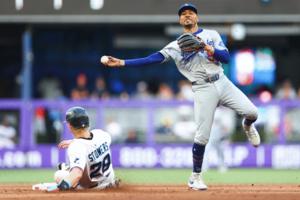
Evan Phillips goes on IL, but Dodgers bounce back with blowout win against Marlins
MIAMI — When minor-league reliever Matt Sauer showed up in the Los Angeles Dodgers clubhouse Wednesday afternoon, it was a sign that something was amiss.
In the middle of the first inning of the team’s 10-1 win against the Miami Marlins, the reason for his arrival finally became clear.
In yet another blow to their increasingly banged-up ...Read more
Popular Stories
- Dodgers lose to Arizona in first real test in 'the best division in baseball'
- Rafael Devers calls out Craig Breslow, Red Sox front office: 'I don't feel that they stayed true to their word'
- Jason Mackey: Derek Shelton was just a symptom of Pirates' larger illness
- Phillies' bats get hot late to complete a sweep of the Rays in 7-6 extra-inning victory
- Tigers sweep sloppy Rockies in doubleheader by combined 21-3 margin





